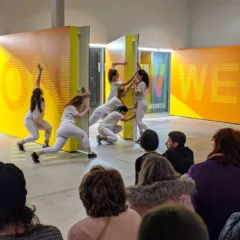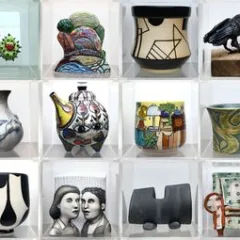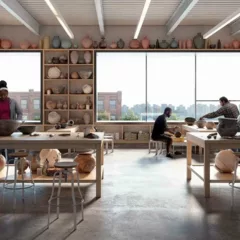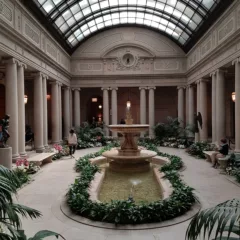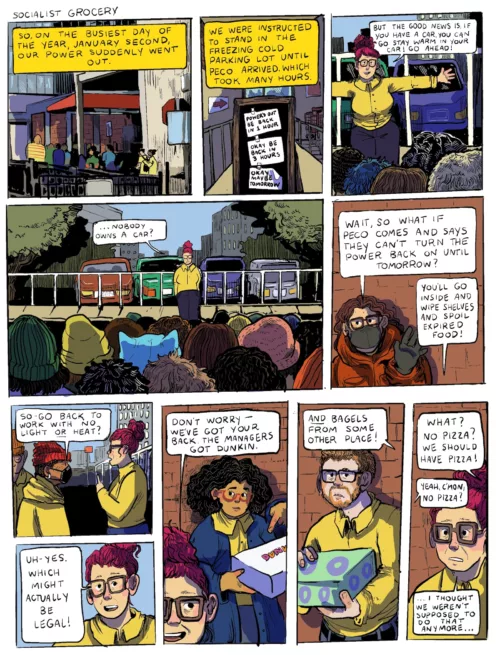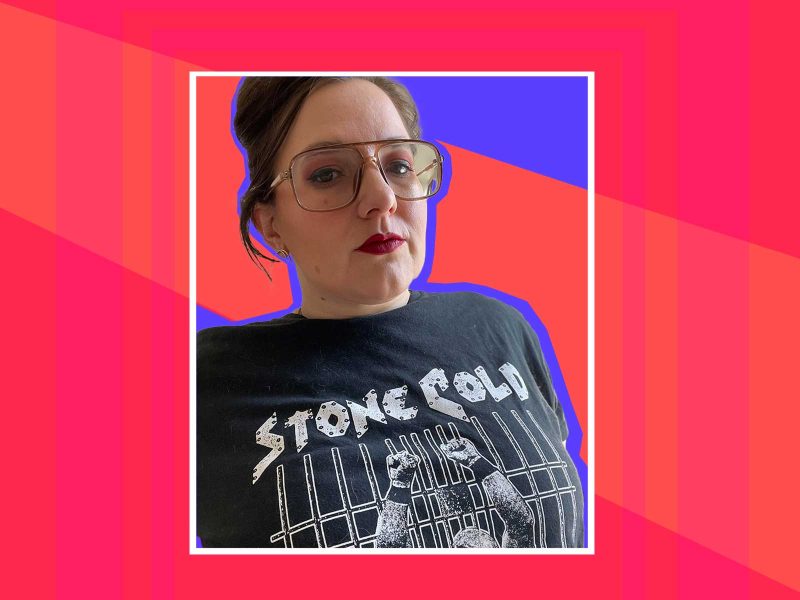
In a lively episode of Artblog Radio, Roberta speaks with Dr. Melinda Lewis, Associate Director of Marketing and Media for the Pennoni Honors College at Drexel University, and the host of the pop culture podcast Pop, the Question, Touching on topics such as “are dolls pop culture?” and how toddler Melinda was entertained with MTV music videos, which she credits as sparking her lifelong love of pop culture, this conversation will leave you with lots of laughs, and things to think about.
The Philadelphia-focused pop culture podcast is now in its fifth season. Tune in to Pop, The Question on their website, PopQPodcast.com, or on major streaming platforms such as Apple Podcasts and Spotify!
This episode of Artblog Radio was sponsored by Pennoni Honors College of Drexel University. You can listen to Artblog Radio on Apple Podcasts and Spotify. Thank you to Kyle McKay for composing Artblog Radio’s original podcast intro and outro!
Transcription
[00:00:12] Roberta Fallon: Hi, everyone! Welcome to this special episode of Artblog Radio, sponsored by Pennoni Honors College at Drexel University. I’m Roberta, and in this podcast, I’m excited to be talking with Dr. Melinda Lewis. Hi Melinda!
[00:00:28] Dr. Melinda Lewis: Hi! How are you?
[00:00:29] Roberta: I’m good. How are you?
[00:00:31] Dr. Melinda Lewis: I’m well, thanks!
[00:00:32] Roberta: Good. Melinda is the Associate Director of Marketing and Media for the Pennoni Honors College at Drexel, And she’s host of Pop, The Question podcast. And we’re very excited to speak to another podcaster! So welcome.
[00:00:48] Dr. Melinda Lewis: Yeah! Thank you so much for having me. It’s going to be interesting to be… talking to another podcaster and being interviewed by another podcaster. I don’t know how to really make sense of this switcheroo! (laughs)
[00:01:00] Roberta: Well, I don’t either, so we’re just gonna wing it. (laughs)
[00:01:05] Dr. Melinda Lewis: Great.
[00:01:05] Roberta: All right. So let’s talk about Pop, The Question. It’s, first of all- it’s a funny title for a podcast, right? When you think of “pop the question” it’s the first thing that came to my mind was getting married, right?
[00:01:22] Dr. Melinda Lewis: Yeah!
[00:01:23] Roberta: But this is not about marriage (laughs)
[00:01:25] Dr. Melinda Lewis: No, I would not be a good podcast host for that.
[00:01:30] Roberta: So, but it is about pop, right? Pop culture. That’s your subject.
Your show started in 2017. You’re in your fifth season. Congratulations. That’s really great!
[00:01:41] Dr. Melinda Lewis: Thank you!
[00:01:43] Roberta: And you started pre- pandemic. So you started interviewing people in a real space, talking to them eye to eye.
How’s it going now? You’re on zoom, I assume. (chuckles)
[00:01:56] Dr. Melinda Lewis: Yeah! (laughs) yes, we are on zoom and we… I think, are still continuing the conversation of how we move forward in this new space that is kind of open and yet not open at the same time.
But yeah, we started pretty pandemic, and now we’re on zoom, and it’s been really interesting to see the ways in which things have stayed the same when you’re interacting with people in these different platforms, but also, the different spaces that open up when you’re on these different platforms. I’m possibly too curious to a fault, and I’m just excited to talk to anybody on any platform, so… I haven’t really noticed much of a difference, I’m pretty sure my editor and producer has definitely had more of an adaptation than I have, cause I’m just excited to talk to anybody and have people talk to me.
[00:02:45] Roberta: You know, that’s a kind of… clue to good podcasting, I think, is a quest for interpersonal connection. It’s really about the connection that you make with talking, and being with someone. The excitement. I can tell you’re that way. You’re an excited person to talk to someone else. And that makes for a good engaging conversation, I think.
[00:03:10] Dr. Melinda Lewis: I hope so. I mean, my mom tells me, she feels very engaged by the conversations, but she’s also my mom. So it’s hard to really measure that. But I hope that… I mean, I genuinely do feel excited talking to everybody about what they’re interested in. I am…. even if I don’t know the topic, I’m just, I really love that people love things?
That to me, is so exciting to learn more about. Like the, why, the, how the, the, how comes… and dive a little bit deeper into that earnestness, and that love, and that appreciation. I’m genuinely really excited, and I hope that that comes through in the editing and that doesn’t get lost.
I don’t think it does. I think our editor, Brian does a really great job trying to maintain that engagement,
[00:03:58] Roberta: Yeah. No, I, I think your editing is superb.
Pop culture is not something that everybody loves. I mean, In the art world, pop culture for many, many years was disdained as “low culture,” right? Against, or in opposition to, art, which was this “high culture.”
That doesn’t happen anymore, pop culture has sort of ascended, almost you could argue, to the dominant culture. It really dominates in all its facets: music, movies, television… We all watch Netflix and listen to iTunes and all that kind of stuff.
So art is sort of a nice, quaint little thing that used to be high. And now it’s sort of brought down off its pedestal a little. I don’t have a problem with this, but I think that there are certain people that don’t like pop culture for that sort of reason.
[00:04:55] Dr. Melinda Lewis: Yeah! And I think, there’s also room for me to acknowledge that… for me, like, yes- there is a line, I guess, between like, “high art” and pop culture. But I feel like in this contemporary post-post-modernity, whatever we’re calling this era, the lines that we could draw are just so liquid and porous that it’s really hard to determine, like where– and this is for me– where high art begins and ends with popular culture.
Like, what do we make sense of, when like Beyonce is filming music videos in museums, and placing herself in context of high art? I love those complications. I love those networks. I love thinking more about it. And I’m sure that there are many people who would say these things should be separate, but I was not trained in that sensibility. I was trained to really appreciate what people were using, or what people were creating, and thinking about what stories people were using, regardless of the form… these like artifacts we’re taking.
Now, that’s not to say that I’m like, totally in love with like, commercialization at any cost, or that I’m like super excited by like Big Industry. But I am still excited that people love Star Wars. I’m still really excited that people are fans of stuff. And I think that there’s a lot of room to play with these lines of like, appreciation, and commerce, and art, and making, that gets really murky, and complicated, and maybe uncomfortable, and weird.
And that’s what I love. I love those like, entanglements, so to speak. And I find those entanglements with high art and popular culture so intriguing and exciting to explore.
[00:06:54] Roberta: I agree with you about the Beyonce thing, in particular- that was mind blowing, and perfect. Really perfect. And they dominated that Louvre museum. They really did.
[00:07:06] Dr. Melinda Lewis: Yeah! And like, had people talking about it. I mean, not that The Louvre was, you know, like nobody had heard of it. But thinking about like, how much discourse then centered around “high art” and “low art.” And then, you know, these intersections of race, class, gender, sexuality, like just how much discourse this opened up, that I think is really exciting when…
I’m accustomed to discourse happening at a very academic level, or a very critical level, and to see these conversations expand into popular publications, I think should be exciting for everybody. Even if you hate it, if you hate that intersection- I still think there has to be some sort of appreciation for these dialogues happening in more public spaces.
[00:07:55] Roberta: Totally. It de-institutionalizes art, and popular culture, and makes them available to more and more people for discussion. Which is a great thing- to bring people together rather than to separate them.
So, let’s talk about your own personal experience with… how did you grow up? Did you have particular loves in your popular culture upbringing? What drove you to… zero in on this field?
[00:08:30] Dr. Melinda Lewis: (chuckles) You know, I don’t remember a life without being consumed by popular culture and consuming popular culture. And I was thinking about this question because I was really trying to find, like a nexus point, and I mean, my dad was stationed in Naples, Italy. And there was a lending library. And they had a VHS tape that was like, eight hours of MTV music videos. And my parents would just turn that on, and I would be captivated for like… I don’t know, the rest of the afternoon. So I’m not even conscious at this point. I’m already consuming these images.
[00:09:08] Roberta: How old were you? Were you a teenager?
[00:09:10] Dr. Melinda Lewis: No, I was like 18 months! (laughs) You know, I’m a toddler. But it was like something, it was like a new mobile! And my parents talk about how I was like three and watching wrestling and doing jump kicks.
So like for me, I was already watching popular culture. And I think the thing that this question makes me think more about, was that I was already, not just passively consuming popular culture, but from an early age I was participating and engaging. Like even as a kid, I would take the narrative that was already set and try to like, place myself in it. Or I was already kind of playing with alternative narratives or I was using my, My Little Ponies for my own kind of drama; my Barbies were this thing…
I was already doing, what I later found out in grad school was like, participatory culture. Like I was already playing with these narratives and creating my own narratives before even really consciously understanding what that relationship was.
And that carried on through high school. And then when I went to college and I realized like, “Wait, you can study like, film? That’s bonkers!” Like, “you can sit and you can watch movies, and talk about them, and read criticism, and just…” Like, that was so exciting to me. And then when I went to grad school, I went to American Culture Studies and at Bowling Green State University, where I did my Graduate work, they have a Department of Popular Culture where I was also taking classes, and they have the Popular Culture Library, and an extensive music library.
And there, it was like, yeah, we study– there are a lot of us who study– popular culture. And we talk about the power dynamics, and, you know, everybody was, people were doing research about fanfictions, or anime, or music, or… you know, there were so many options. And so it was really exciting to be surrounded by people who were equally as invested, equally as engaged, and equally excited in sharing that knowledge and building knowledge together.
So the short answer is, I don’t know when it started. Like Billy Joel, I didn’t start the fire, it’s always been, you know, burning since the world was turning… That’s kind of how my relationship with popular culture has started. And then, you know, as I’ve continued to teach and have continued to work in this Department of Marketing and Media, I’m still really excited to learn like what people are watching and, and what people are engaging in. And you know, what, what is exciting to people?
These are the conversations that I get really invested in and excited about.
[00:11:58] Roberta: Okay, so you made so many points there, I’m trying to deconstruct here
[00:12:03] Dr. Melinda Lewis: (laughing) I’m sorry!
[00:12:04] Roberta: (chuckling)
[00:12:04] Dr. Melinda Lewis: I don’t this this to be also like a therapy appointment of like, “when my mom made me watch MTV videos at 18 months old…” She knows! I mean, it’s in my bio, it’s fine. Like she, I think she appreciates it because I have a PhD, so it all kind of paid off in the end.
[00:12:20] Roberta: Yeah, no, it’s great!
It strikes me that children always play with toys, and toys have always been part of the culture. But things like MTV are more pop culture than a baby doll. You know what I mean? So how do you in fact define what is, or is everything, pop culture?
[00:12:45] Dr. Melinda Lewis: I mean, yeah, that’s a complicated question. It’s like trying to define anything.
For me, I mean… For me, popular culture encompasses mostly everything. It’s not necessarily tied to… I think a lot of people would just assume that popular culture is tied to the like capitalization of culture? Which I understand that argument, but at the same time that capitalization or that commercialization has to also stem from somewhere. So are we saying that those who are like making artisanal dolls are not a part of pop culture and that like, only cabbage patch dolls count as popular culture?
I mean, how many people does it, constitute to make something popular? Like, I think that we get into these like weeds of like, “well, 10 people equals popular.” So “your artisinal doll means nothing now because it’s on Instagram and more than 10 people know about it. And so it’s popular and therefore I’m not interested in it.”
For me, I think that these things are so intertwined that it really is hard to distinguish what is what, and I think for me, the question is like, okay, well, how are people interacting with this thing? What are the power dynamics of this thing? Like who is making it, how are people receiving it? How are people using it? Like, are they using it as the quote unquote “intended method of using,” are they using it in some other alternative way? And what is the value of it? Like, what are people accepting it as value, and as valuable to them or in their lives? And to me, that that really does encompass so much, that I find it really impossible to kind of define it beyond, like, I don’t know, it’s kind of everything.
[00:14:32] Roberta: Right, everything.
[00:14:33] Dr. Melinda Lewis: Everything, but nothing, but everything.
[00:14:35] Roberta: Well, not nothing, but yeah, no, I, I hear what you’re saying. And to a certain extent, my question was not even valid because defining something is a way of locking it down and everything you’ve been talking about is sort of the opposite direction. Which is: it’s loose, it’s undefined, it’s the Cuisinart of what’s around us.
You know, everything spinning in the centrifuge- and it’s probably better off left that way. but that makes it really hard.. I want to know how you decide what to talk about on your podcast, because if it is truly everything, how do you zero it into what?
[00:15:22] Dr. Melinda Lewis: Yeah! I mean, it’s a great question. I think that we don’t really start with topic as much as we start with people, and really thinking about what people are interested in. And it’s been very organic. So for example, we had a colleague of ours come up and say, “I was talking to this administrator on campus, and he’s like, super into wrestling. And I did not know that before. Like, would that be like, do you think you would maybe want to do something?” And I was like, “Absolutely, I would!” And that’s not something that this administrator is, you know, running around, talking about, it just comes up organically in conversation or, you know there’s a reference made.
And I think that, that’s where we start, it’s with the people and then like, what, what is interesting? Like what are you reading? What are you watching? Like what are you into? What excites you? What brings you joy? And particularly as a campus, like one of the things that I say often is that, at a university, you are accustomed to being asked things like, “well, what is your major?” “What is your field?” “What do you write?” “What do you do?” Like all these things about “what do you do?” And I think for us, the podcast is really like, “what brings you joy?” Like, what is the thing that like stimulates you? Like, what do you do after your work? What, what is the thing that excites you? And that, to me is a super exciting space to explore.
And I think that’s why the podcast really works for me is… that I think that there are a lot of points where people talk about what they like, but I don’t necessarily think that we get to fully explore why people like the things that they like. Or give an opportunity to really, without any sort of judgment, or whatever, talk about like, “I love this thing. I love doing this thing, this excites me.” And I think this that’s the space that we have tried to carve out with this, with this particular podcast.
And the reason why I think it’s for me really fun to talk to people is because it’s not about trying to like, do a critique or trying to, you know, interrogate them. It’s really about like, just share with me- what is the thing that you love?
[00:17:34] Roberta: Yes! A true podcaster. Yes. “What do you love?” That is the question. That’s what people want to hear. Especially now. It’s very compelling, very compelling. We’re all more isolated than we’ve been in the past. And we miss our friends and we miss conversation. And so podcasting, I think with the human voice in your ear connects you.
And if you’re talking about joy, it’s going to bring you happiness, I would think. not anger. Get rid of the anger for awhile. (chuckles)
[00:18:09] Dr. Melinda Lewis: Yeah. I think there are tons of places where you can access punditry. There’s tons of places, if you love to read like, hot takes, there are a lot of opportunities to do that. And I get it, I love reading hot takes as well, but I think that, I am really at this point– and it’s also maybe like a life thing– I’m just really excited to hear what people like and enjoy more so than, you know, let’s just tear something apart. I think that… yeah, I’d rather just, I want to build stuff with each other. Not necessarily let’s you know, deconstruct and just throw on the floor and call it useless.
Like, I love finding, even those banal, or like quote-unquote “frivolous” things. I love finding the value in that.
[00:18:54] Roberta: Me too. I love it also. (chuckling) So kindred spirits here, everybody.
Who’s your audience? This is run at Drexel, through Drexel- is it pitched at the Drexel audience?
[00:19:07] Dr. Melinda Lewis: I think we try our best to pitch it to the Drexel audience and try to build these networks. And, you know, for us, a large part of it is to showcase the human element on a campus. To go back to that idea of like, “what do you do and how do you do it?” You know, a campus is comprised of human beings, who are multifaceted, and have joy, and experience pleasure, and have things that they like to read, and listen to, and watch. And so I, I hope that we tap into the Drexel community and create like a little, a little morsel to like feed the brain in a different way.
I think we also are really excited to tap further into like, Philadelphia? And are, I think our building our networks more regionally as well?
You know, we’ve interviewed people from and within the city, like Perry Shall, who collects t-shirts. We talked an entire episode about thrifting and like finding t-shirts. And he also does artwork for bands out of Easy Eye Sound. And we also talked to Nancy Barile, who was a part of the Philadelphia punk scene in the 1980s, she talked about her book, and about growing up in and around Philadelphia and going to concerts and booking shows and all of that.
And then of course, I think every podcast’s dream is like, the dream audience is everybody, right? Like we want everybody to listen to it. But I think for us, it’s about really localizing and tapping into the Drexel community and outside-Philadelphia community.
Because so much of what we want to do is shine a light on, one, the interesting people at Drexel, but also acknowledge the fact that we are part of a larger fabric that we are, you know, ingrained in, in Philadelphia. And that Philadelphia is a really cool city that is full of really great, like pop culture influences, a lot of great art, a lot of that blending of like art and pop culture.
We will not allow Philadelphia to be ignored, is is what I’m trying to say.
[00:21:14] Roberta: (chuckles) Yeah, that’s good.
I just want to say I wonder, the pop culture that you grow up with and how it affects the pop culture that you live in- you know, you are the past as well as the present. So you grew up listening to… well, in my case, The Beatles and The Rolling Stones and all the rest of that, and that’s still with me, I can still hum those tunes, but I now have other things that I love.
So there’s counter currents that go back and forth generationally in pop culture. Do you ever get into that when you’re talking with people? About, the weaving together of the influences of the past and what they’re listening to now, and you know, how it’s coming together or not coming together?
Does a Beatles loving baby boomer automatically hate hip hop, for example you know, that how is the crossover coming together or does it not, or is that even something to consider.
[00:22:20] Dr. Melinda Lewis: Oh, I think it’s definitely something to consider. Absolutely. And I think that for me, context always matters. So if we’re talking about like, the Beatles were always pulling outward, and if we’re talking to a particular person, like one of my first questions is like, let’s go back to the beginning of time.
Like, how did you even come to light this topic? And a lot of those influences start really young. Of like, either learning from your parents, or some sort of parental influence of some sort kind of coming through, or accessing somebody who is more familiar in, in the field. So we just did an episode about like the meaning of life and woodworking and the person we interviewed talked about tapping into somebody who had been woodworking for far longer and could offer advice and patience and all of that stuff.
And so frequently, I think we talk about that cross-generational influence. And what I think is really important is to think about like, neither us as people are emerging from a Chrysalis fully-formed, and popular culture does not do the same thing. Like it is constantly informed by the past. As it is also currently pushing toward the future and influencing the future before the future even happens.
And so I think it’s always really important to go back to either the historical references or to our own personal references and understand how those histories overlap, when they overlap and how these ideas, these like intersectional points, come together to like, create either the topic, or the people, or both. And those, those, those intersections, I think are some of the most exciting to explore. Like, we actually did an episode about The Beatles for the Podcast Festival and none of us were there for the Beatles, but we all had histories of how we came to listen to The Beatles in a variety of ways, and could appreciate it, even though we were out of the time in which they, they emerged.
But thinking about the continued relevance, the continued irrelevance, like in how, the shapes and the shifts and the, the impacts- like all of that makes I think for a really dynamic and cool conversation.
That I think anybody can have, I don’t think you need to be an expert on popular culture to have those conversations, because I think those contexts can be either very personal or you can dive deeper into these larger extended histories, if you so want, depending on what kind of fan you are.
[00:24:59] Roberta: Yes. One of the podcasts that I listened to– and I want to say some of your podcasts are 19 minutes long, very, very short (We try to keep it at 30 minutes, and we don’t do any splicing of, you know, music or film clips in, but you’ve got a very rich editing process where you put a lot of extra material in the mix)– and then some of your podcasts are like 40, 50 minutes long.
So how, how do you decide how long to go? Is it the subject or…
[00:25:36] Dr. Melinda Lewis: No, that’s a great question. I think that we have always tried to aim for around 20 minutes and that has always been a major part of the conversation as to like, how we structure the podcast. I think we thought 20 minutes was like a nice nap for the brain, that it was like enough to just kind of delight and distract, but not enough that your day would be completely overrun by this like, narrative.
And also understanding that there were a lot of stories, like there were already a lot of podcasts out there that were like an hour, or sometimes two hours. And, you know, we’re a very small organization. And so we wanted to kind of start small as opposed to just dive in and with, you know, an hour plus, two, expectations… Particularly at the beginning when we like didn’t really know what this was. Or how this was going to work. So, to work with 20 minutes seemed more manageable and sustainable.
The 45 minute episodes are rare, but they’re present, because they’re usually live or they feature more than one person. And so we want to make sure that everybody has the opportunity to participate if we’re having a panel discussion or we’re having a group conversation.
So. It’s mostly about like volume and ensuring that everybody has space. Cause we don’t want to, we don’t want to limit the conversation in a way that like, has people have snippets, but nothing really kind of coagulates. But we also don’t want to have like a bloated episode where, you know, everybody is just talking for forever and ever.
[00:27:17] Roberta: I love that you use coagulate! (laughs) I’m getting this image of coagulation of voices…
[00:27:27] Dr. Melinda Lewis: You know what, I can’t think of the last time I used coagulation.
[00:27:30] Roberta: It’s… like probably in chemistry or something!
[00:27:34] Dr. Melinda Lewis: Yeah, from my gut to my heart, to my, my mouth. But yeah, I think that we still want to maintain, even if it’s a 45 minute episode, we still are typically recording still for an hour, and an hour and a half. We still want to make it concise. We still wanna make it cohesive. We still wanna make it poppy. So even though they are longer, it’s typically because we are interviewing more people and we’re trying to tie a little bit more together than just if I’m doing something one-on-one.
[00:28:05] Roberta: Yeah. No, I hear you. It does- we’ve had podcasts where there’ve been three or four people and you have to respect everyone’s voice.
[00:28:16] Dr. Melinda Lewis: Yeah.
[00:28:17] Roberta: does go longer.
Well, speaking of time, and voices… we are going to circle around here and say, we’re almost coming to the end- is there anything Melinda that you’d like to say that we didn’t cover?
I feel like we covered a lot, but didn’t cover even the tip of the iceberg. You know what I mean?
[00:28:38] Dr. Melinda Lewis: I know. I mean, it’s gone by so fast (laughs) so it’s hard, it’s a kind of dizzying to think about what we haven’t talked about. Although I would be interested to know if you could talk about, if you had to be on the show, what would you want to talk about?
What brings you joy, Roberta?
[00:28:55] Roberta: Oh, my gosh. Artblog, working with Morgan, artists, living in Philadelphia, feeling the love of the Philadelphia art community… my family (I have three children and a couple of grandkids), my husband… You know, making art sometimes. Writing. Editing, I love, I love words.
[00:29:23] Dr. Melinda Lewis: Yeah.
[00:29:24] Roberta: They bring me joy.
[00:29:25] Dr. Melinda Lewis: This is a good position. I mean, a podcaster who loves words, is pretty good!
[00:29:30] Roberta: I do love people too. I’m like you, I love people. Love to find out about them and pick their brains about things. You learn a lot.
[00:29:39] Dr. Melinda Lewis: You do! And I feel like the thing that I really love about talking to people is that you get to… like, I spend so much time after the fact thinking about stuff and like, I feel like I’ve learned something. I feel like I’ve gained something through every conversation, and something valuable for me intrinsically, as a person.
And so I think talking to people, and you know, having these one-on-one conversations- like Roberta, I’m going to be thinking about this conversation for a long time and being like, “I mean, are dolls popular culture? I don’t know!” I’m going to have to talk to everybody about this question and, you know, that’s what I find so exciting is that from this, I will go out and have conversations with other people and talk to my friends and ask them, and… you know, I think that that’s really good.
Like that’s what building a community is. And that to me is like– particularly now, I know that we’ve talked a little bit about the pandemic, but– I love that this is what conversations can do. Is that it can bridge gaps, that it can bring people closer together.
And I think that by focusing primarily like, on joy, and excitement, and earnestness, and like really privileging those, that we can build like a nicer, kinder, you know, understanding of each other and build a firmer community.
[00:30:55] Roberta: Bravo. I echo all of that. It’s been great speaking with you!
I’ve been speaking with Dr. Melinda Lewis, of Pop, the Question podcast. It’s a sponsored podcast on Artblog Radio from Pennoni Honors College of Drexel University.
Thank you so much, Melinda.
[00:31:14] Dr. Melinda Lewis: Roberta. Thank you so much. It was such a pleasure. I could do this for like three more hours.
[00:31:19] Roberta: Me too. Okay. Bye.
Bye.


